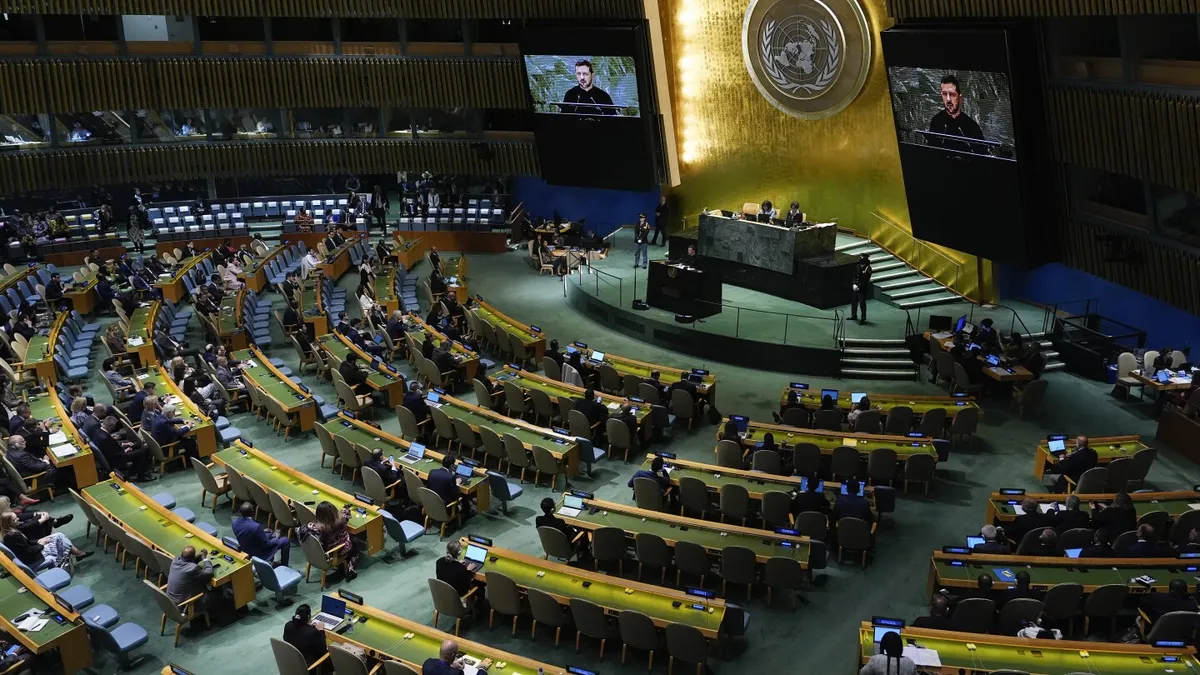
The U.N. Security Council has approved a resolution sponsored by the United States that calls for a swift end to the ongoing Ukraine war. Notably, the resolution does not mention Russian aggression. The resolution received a vote of 10-0, with five countries choosing to abstain.
Earlier on Monday, the U.N. General Assembly rejected the initial U.S.-drafted resolution. This version was only passed after being amended to explicitly state that the conflict arose from a “full-scale invasion of Ukraine by the Russian Federation.”
On the third anniversary of Russia's invasion, the U.N. General Assembly adopted two resolutions emphasizing the need to end the war. Both resolutions clearly identified Russia as the aggressor, a significant shift from the U.S. draft that omitted such mentions.
This development represents a setback for the Trump administration within the 193-member world body. Although these resolutions are not legally binding, they serve as a reflection of global opinion. The assembly approved a European-backed resolution from Ukraine demanding an immediate withdrawal of Russian troops, labeling Moscow's actions as a violation of the U.N. Charter.
In a surprising move reflecting the Trump administration's stance, the United States joined Russia in voting against the Ukrainian resolution, which passed with a vote of 93-18 and 65 abstentions. This outcome indicates some diminished support for Ukraine, as previous votes saw over 140 nations condemning Russia's aggression.
The U.S.-drafted resolution, acknowledging the tragic loss of life due to the Russia-Ukraine conflict, was amended by France to include the statement that the conflict was the result of a “full-scale invasion of Ukraine by the Russian Federation.” Supported by more than European countries, these amendments affirm the assembly’s commitment to Ukraine’s sovereignty and call for peace in line with the U.N. Charter.
Despite the amendments, the resolution passed with a vote of 93-8 and 73 abstentions. Ukraine voted in favor, while the U.S. abstained, and Russia voted against it.
Ukrainian Deputy Foreign Minister Mariana Betsa emphasized Ukraine's "inherent right to self-defense" following Russia's invasion, which breaches the U.N. Charter's principles of respecting sovereignty and territorial integrity. She called for global support to uphold the Charter and achieve a just and lasting peace.
U.S. Deputy Ambassador Dorothy Shea highlighted that multiple prior U.N. resolutions condemning Russia have failed to halt the war, which has had devastating impacts on Ukraine, Russia, and beyond. Shea stressed the need for a resolution that secures a durable end to the conflict.
The contrasting resolutions underscore tensions between the U.S. and Ukraine, exacerbated by the Trump administration's unexpected negotiations with Russia. European leaders expressed concern over being excluded from preliminary discussions, as President Trump hosted French President Emmanuel Macron in Washington.
In escalating rhetoric, Trump labeled Ukrainian President Volodymyr Zelenskyy a "dictator," accusing Kyiv of initiating the war. In response, Zelenskyy stated that Trump was influenced by Russian misinformation.
The U.S. intends to seek a vote on its proposal in the U.N. Security Council, where resolutions carry legal weight, and veto power is held by the U.S., Russia, China, Britain, and France. China, presiding over the council this month, has scheduled the vote for Monday afternoon.
A U.S. official, speaking anonymously, indicated that the United States would veto any amendments from Russia or the Europeans.
The General Assembly has become the primary U.N. body addressing the Ukraine conflict, as the 15-member Security Council remains gridlocked by Russia's veto. Since the invasion began on February 24, 2022, the General Assembly has approved several resolutions condemning the invasion and demanding the withdrawal of Russian troops.
Russia's U.N. ambassador, Vassily Nebenzia, recently commented that the original U.S. resolution was "a good move."
The Ukrainian resolution adopted on Monday recalls the necessity of implementing previous assembly resolutions against the aggression. It demands Russia's unconditional withdrawal from Ukrainian territory and reaffirms Ukraine's sovereignty, emphasizing that territorial acquisitions from force are legally unrecognized.
The resolution calls for de-escalation, an early cessation of hostilities, and a peaceful resolution to the war against Ukraine, reiterating the urgent need to end the conflict this year.